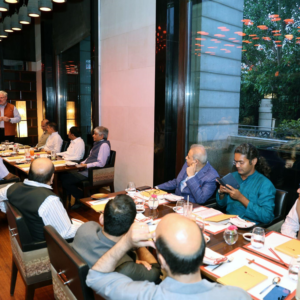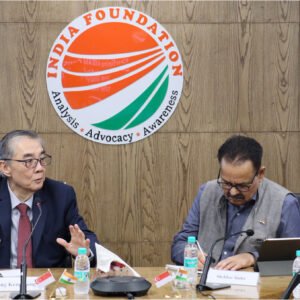
 India Foundation and the US India Business Council held bilateral discussions on 7th April 2016 at Villa Medici, Taj Mahal Hotel, New Delhi.
India Foundation and the US India Business Council held bilateral discussions on 7th April 2016 at Villa Medici, Taj Mahal Hotel, New Delhi.
Welcoming the USIBC delegation on behalf of India Foundation, Shri Shakti Sinha, Director, said that in the context of an uncertain global economy that shows no signs of recovery, India looks towards foreign investment to help it step up its GDP growth rates to around 10% that it requires to achieve its national development goals. In this context while the present government has made improving the investment climate, or what is popularly known as ‘the ease of doing business’, and taken many steps in that directions, clearly much more has to be done. He requested the USIBC delegation to give specific suggestions on the obstacles or bureaucratic snafus their members faced when doing business in India, so that the quantum of FDI flows for the US increased substantially.
 Ambassador Frank Wisner, who led the USIBC delegation said that the economic success of India is extremely important for USA and that the Indian growth rate which is at present above 7% can go up to 10%. He observed that only opening markets and driving them to competitiveness and bringing in best practices from around the world would ensure accelerated economic growth. Copies of a document titled “India’s Rise: A strategy for trade-led growth” prepared by C. Fred Bergsten of Peterson Institute for International Economics were circulated and Ambassador Frank Wisner remarked that they could only give analysis of how America looks towards India, but India must design its own package of ideas. He expressed a wish that India must join APEC and added that he had indication from Finance Minister of India that govt. of India would look at the prospect positively. He wished that India would grow better, stronger and more influential and be a global player. He said that USIBC values relationship with India Foundation and looks towards intensifying things both organizations can do together. Ambassador Teresita Schafer, Senior Advisor, McLarty Associates said that USA would certainly not throw away all trade barriers and therefore cannot ask India to throw them away. He also said that USA was trying to be friendlier to India’s exports. Mr. Kenneth I. Juster, Partner & Managing Director, Warburg Pincus said that their member companies are making investments in India in a big way. He said that they expect a greater clarity in policy making in India. He said that though FDI limit in insurance sector had increased from 26% to 49% in India, not a single US Company took advantage of it and increased its investment from 26% to 49% percent because they wanted management control of their capital which was not permissible.
Ambassador Frank Wisner, who led the USIBC delegation said that the economic success of India is extremely important for USA and that the Indian growth rate which is at present above 7% can go up to 10%. He observed that only opening markets and driving them to competitiveness and bringing in best practices from around the world would ensure accelerated economic growth. Copies of a document titled “India’s Rise: A strategy for trade-led growth” prepared by C. Fred Bergsten of Peterson Institute for International Economics were circulated and Ambassador Frank Wisner remarked that they could only give analysis of how America looks towards India, but India must design its own package of ideas. He expressed a wish that India must join APEC and added that he had indication from Finance Minister of India that govt. of India would look at the prospect positively. He wished that India would grow better, stronger and more influential and be a global player. He said that USIBC values relationship with India Foundation and looks towards intensifying things both organizations can do together. Ambassador Teresita Schafer, Senior Advisor, McLarty Associates said that USA would certainly not throw away all trade barriers and therefore cannot ask India to throw them away. He also said that USA was trying to be friendlier to India’s exports. Mr. Kenneth I. Juster, Partner & Managing Director, Warburg Pincus said that their member companies are making investments in India in a big way. He said that they expect a greater clarity in policy making in India. He said that though FDI limit in insurance sector had increased from 26% to 49% in India, not a single US Company took advantage of it and increased its investment from 26% to 49% percent because they wanted management control of their capital which was not permissible.
 Shri Ram Madhav appreciated USIBC’s desire to host an event in US if the Indian PM decides to visit US in the middle of this year. He said that India’s admission to the membership of an expanded APEC and of NSG, strengthening co-operation on solar energy front and collaboration in defence sector would go a long way in strengthening bilateral relations between India and US. F-16 manufacture in India would be a big thing to happen and Indian government would have the domestic political challenge of answering harsh criticism and clearing misinformation. He said that US must understand and appreciate India’s growing interest and ambition in Indian Ocean. He said while trade and investment is important, it is not exclusive but part of a larger vision. India has strategic goals and larger diplomatic objectives to be achieved and the present government had taken a conscious decision to move ahead on a direction which though difficult, is clearly defined.
Shri Ram Madhav appreciated USIBC’s desire to host an event in US if the Indian PM decides to visit US in the middle of this year. He said that India’s admission to the membership of an expanded APEC and of NSG, strengthening co-operation on solar energy front and collaboration in defence sector would go a long way in strengthening bilateral relations between India and US. F-16 manufacture in India would be a big thing to happen and Indian government would have the domestic political challenge of answering harsh criticism and clearing misinformation. He said that US must understand and appreciate India’s growing interest and ambition in Indian Ocean. He said while trade and investment is important, it is not exclusive but part of a larger vision. India has strategic goals and larger diplomatic objectives to be achieved and the present government had taken a conscious decision to move ahead on a direction which though difficult, is clearly defined.
Ambassador Ranjan Mathai emphasized the need for driving lot of technology into solar energy field and the role USA can play in this. Ambassador Ashok Kantha suggested that since global trade was flat, trailing growth in global GDP, India may not have the option to look at trade-led growth; instead it would have to rely on investment-led growth. He also suggested that USA should fast-track and facilitate the mechanism of India joining APEC. Dr Shamika Ravi, Senior Fellow, Brookings India, said that India would be able to sustain growth above 7.5% as it is laying foundational structure for growth. She also spoke of the need to rethink about the existing world order of trade and that India was open to lot of experimentation. She added that poverty eradication would have to remain the primary focus of the Indian agenda.
Sri Binod Bawri, Chairman, Bawri Group, Kolkata said that we should also look beyond GDP growth rates; programmes like Swatch Bharat would improve quality of lives of people. He also spoke of the need to focus on brining in best practices in the running of the economy. Ambassador Rajiv Sikri said that it would have to be seen whether the US Congress would approve Trans Pacific Partnership (TPP). If the TPP were to come into effect, it would change the rules of the game. He said countries like India had to go through considerable sacrifices in joining WTO and now it seems that WTO+ was likely to come. He said India would have to judge the efficacy of any proposed reform measures in terms of how it would help create jobs in India. He said that India wanted more freedom with regard to movement of labour whereas for the USA, the priority was more freedom with regard to movement of capital. The two countries would have to find a balance between both so that there would be growing convergence of long term goals of both India and USA.
Shri Shaurya Doval said that when India and USA are strategic partners, an element of strategic partnership was to understand at what stage of economic evolution the other partner was. He said India’s growth had to be employment-led; ensuring job creation was a political compulsion as about a million people join workforce every month. He said India needs lot of capital to generate employment and USA needs to deploy its capital. It is a biggest opportunity to marry both. He also requested intellectual inputs from USIBC to enable India to look at and improve its own systems in order to attract capital.
Shri Shakti Sinha, Director, India Foundation who led the delegation from India Foundation presented a memento to Ambassador Frank Wisner and warmly thanked the entire delegation from USIBC for the valuable interaction and looked forward to future collaboration.




